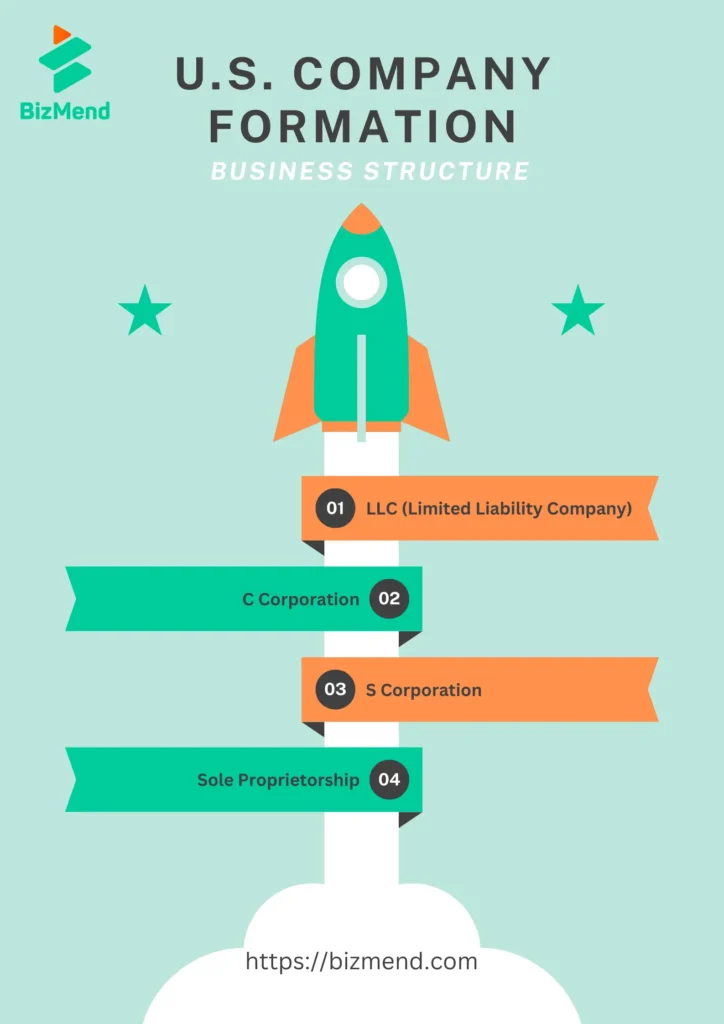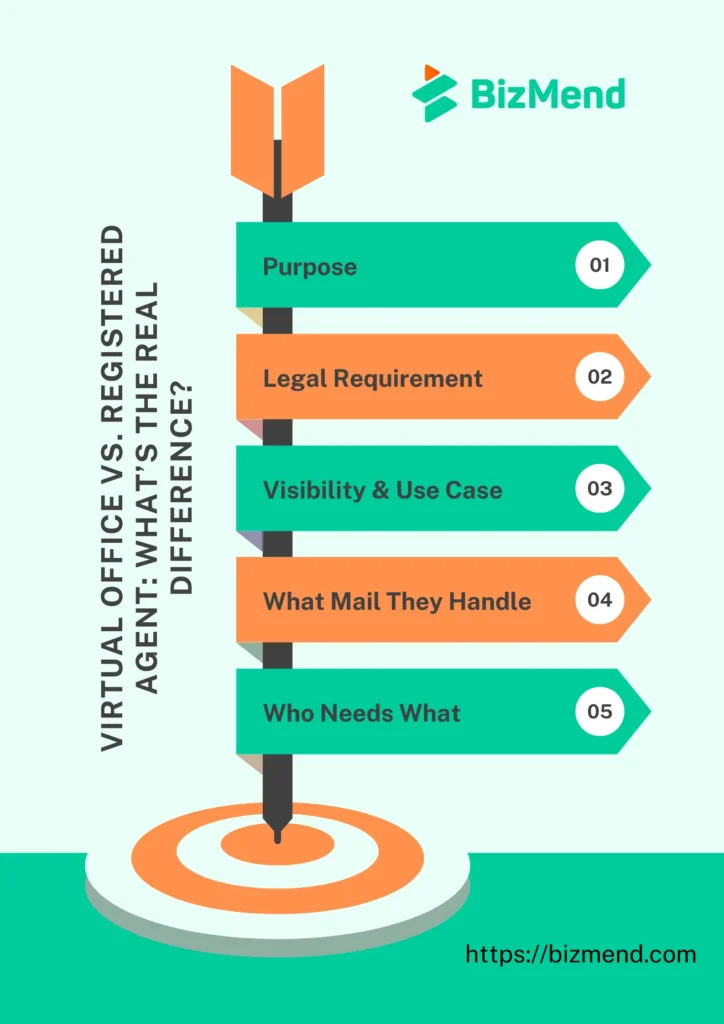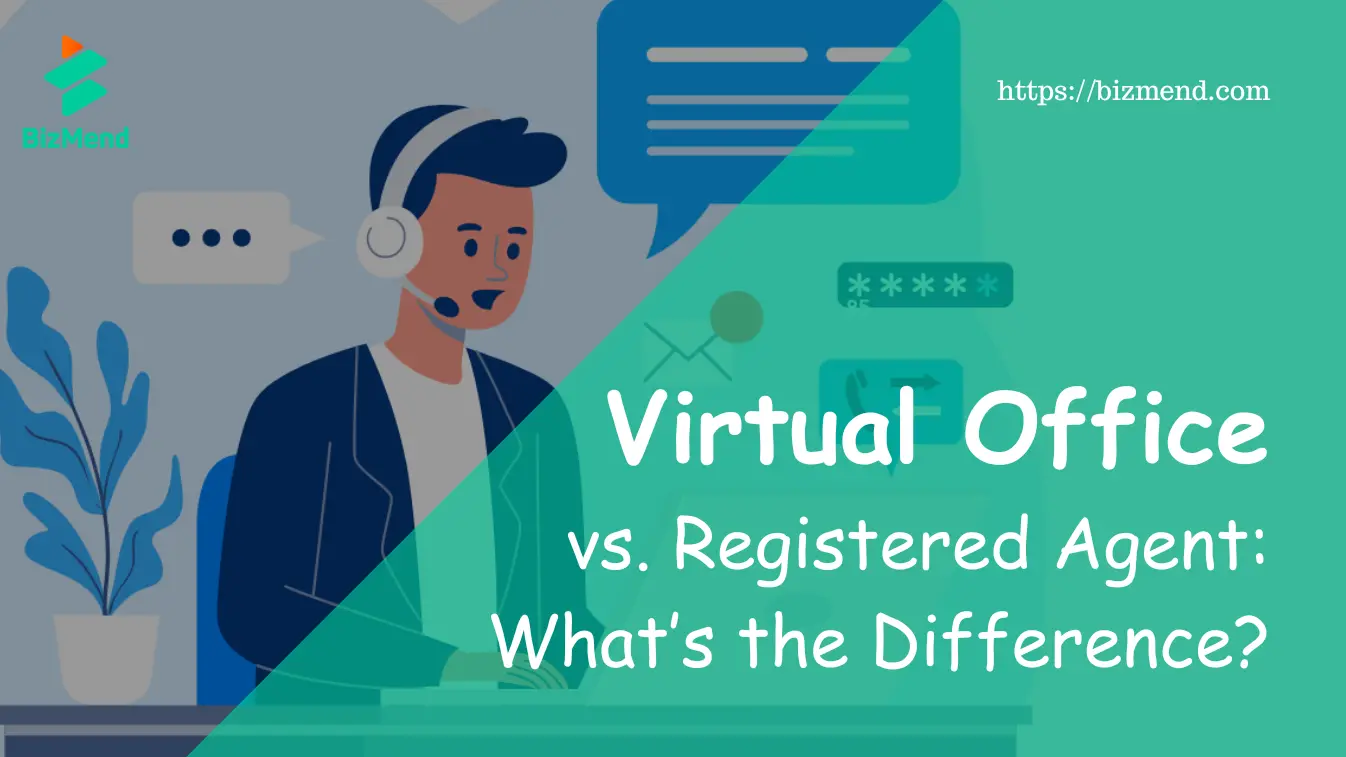“One keeps you compliant with the law. The other keeps you looking legit. But they’re not the same, and you’ll probably need both.”
Let’s Clear the Confusion
If you’re setting up a business in the U.S.—especially as a non-resident—you’ve probably come across terms like “virtual office,” “registered agent,” and “business address.”
And they sound similar. Some even offer both in one plan.
But here’s the thing: they serve different legal purposes. One is optional. One is required.
Let’s break down what they mean, what they don’t, and how to use them the right way.
A Quick Word on U.S. Company Formation
Before diving into the main topic, let’s have a quick rundown on U.S. company formation. The U.S. lets you choose from a few main business structures:
- LLC (Limited Liability Company): Flexible, beginner-friendly, and the go-to for most small to medium-sized businesses
- C Corporation: Best if you’re raising funding or issuing shares
- S Corporation: Tax-efficient but only available to U.S. citizens or residents
- Sole Proprietorship: A sole proprietorship is simple, but not ideal for liability protection (and not for non-residents)

As for where to register?
Most founders pick from:
- Delaware: Known for its investor-friendliness and startup reputation
- Wyoming: Great for privacy and low costs
- California: Perfect if you’re physically based there (but pricey)
For more details, check out “US Company Registration: Everything You Need to Know,” “Difference Between LLC and C Corporation in the U.S.,” or “S Corp vs C Corp: Which One Should You Choose?”
This context matters—because your virtual office and registered agent will connect directly to the structure and state you choose.
What Is a Registered Agent?
Think of a registered agent as your company’s legal “first responder.”
Every U.S. company—LLC or Corporation—is required by law to have one. This person or company receives:
- Legal notices (like lawsuits)
- Government documents
- Tax forms
- Compliance reminders
Your registered agent must:
- Be physically located in the same state your company is formed
- Have a real street address (not a P.O. box)
- Be available during standard business hours
If you’re forming an LLC in Delaware, Wyoming, California, or anywhere else, this step is non-negotiable.
What Is a Virtual Office?
A virtual office is exactly what it sounds like—a remote business address and support service, designed to make your company look and operate like a real U.S. office without having a physical space.
It usually includes:
- A professional business address (used for client-facing materials)
- Mail forwarding or scanning
- A U.S. phone number
- Optional receptionist or meeting room services
But here’s what it’s not:
It’s not a substitute for your registered agent. It’s also not required by law. It’s a tool—not a legal obligation.
Virtual Office vs. Registered Agent: What’s the Real Difference?
Let’s stop treating them like synonyms—because they’re not.
If you’re forming a U.S. company for the first time (especially as a non-resident), this is one of the most misunderstood parts of the setup. People often think, “I’ve got an address—so I’m covered, right?”
Not necessarily.
And let’s discuss in detail for your better understanding:
1. Purpose
A registered agent exists for one purpose: legal compliance.
They receive government documents, tax notices, and legal papers on your behalf. That’s their job. And it’s legally required.
A virtual office exists to give your business a professional front—a U.S. address you can use for marketing, customer trust, or operational polish. It may come with extras like mail forwarding, a phone line, or even receptionist services.
2. Legal Requirement
A registered agent is mandatory. Every LLC or Corporation formed in the U.S. must list a registered agent with a physical address in the state where the company is formed.
A virtual office is optional. It’s useful, but no U.S. state requires you to have one.
This means that you can’t legally skip the registered agent, but you can absolutely run your business without a virtual office—especially if you don’t need customer-facing infrastructure.
3. Visibility & Use Case
A registered agent’s address goes on your official company filings. It becomes part of the public record. You don’t usually promote it—it’s there for legal and administrative reasons.
A virtual office address is what you put on your website, business card, invoices, or email signature. It’s the address you want clients to see, and it usually looks a lot nicer than your agent’s address.
Think of it like this:
Your registered agent is your backstage handler.
Your virtual office is your front-of-house.
4. What Mail They Handle
Registered agents are only responsible for official government and legal documents. If someone sues your company? That notice goes to the registered agent. If your state sends you a franchise tax reminder? That’s on them, too.
Virtual office providers mostly deal with general business mail—packages, correspondence, checks, even marketing spam. Some may forward scanned documents to you, or store physical mail for pickup.
- Don’t expect your virtual office to notify you about a lawsuit. That’s not their lane.
5. Who Needs What
You need a registered agent if:
- You’re forming a U.S. LLC or Corporation
- You’re based outside the U.S. and need someone local
- You want to stay compliant and avoid missing important deadlines
You may want a virtual office if:
- You want your business to look “local” in the U.S.
- You don’t want your registered agent’s address listed on your website
- You need a professional U.S. mailing address or phone line
- You want someone to receive and forward non-legal mail
They serve different purposes. And depending on how you’re setting up, you may need one, the other, or both.

Virtual Office vs Registered Agent: Side-by-Side Comparison
| Aspect | Registered Agent | Virtual Office |
| Legally Required | Yes, it’s legally required in every U.S. state. | No, completely optional. |
| Main Purpose | Receive official government, tax, and legal documents. | Provide a business address for branding, mail, and communication. |
| Who Uses It | Every LLC or Corporation. | Founders who want a U.S. presence without a physical office. |
| Appears on State Records | Yes, publicly listed with your formation documents. | No. Not part of your company’s legal filings. |
| Used for Client Communication | No, not designed to be public-facing. | Yes, put it on your website, invoices, email, etc. |
| Mail Handled | Only legal/government documents | Business mail, packages, checks, customer letters, etc. |
| Physical Presence Needed | Must have a street—a real one—address in the state where your company is registered. | Can be in any state—flexible across jurisdictions |
| Available During Business Hours | Required. Must be accessible 9–5, Monday to Friday. | Not required, varies by provider. |
| Best For | Staying legally compliant, avoiding missed deadlines | Looking professional, building brand credibility in the U.S. |
| Common Misuse | Mistakenly using a virtual office as your legal agent (not allowed) | Assuming it’s legally sufficient (it’s not—registered agent still required) |
Do I Need a Virtual Office?
Not always. But it helps if:
- You’re a non-resident founder and want a U.S. address for credibility
- You probably don’t want your registered agent address popping up in a Google search.
- You want to separate your legal address from your public-facing one
- You want a more “professional” feel when clients look you up
U.S. business culture often values a business that “looks local.” A virtual office helps you get that look—even if you’re managing things from Dhaka, Delhi, or Dubai.
Can One Service Offer Both?
Yes, many providers bundle both services. But don’t assume one means the other.
When choosing a provider, ask:
- Can I use this address as my registered agent in the state I’m forming in?
- Will this address appear in state filings—or just on my marketing materials?
- Do they notify me instantly of official documents or time-sensitive mail?
You don’t want to miss a tax deadline because your “virtual address” wasn’t legally acting as your registered agent for your U.S. LLC.
Consult with an expert to stay compliant.
Real Talk: Which One Comes First?
If you’re starting a company, having a registered agent isn’t optional—it’s a must-have.
Your virtual office is an optional add-on to build presence and polish.
If you’re starting lean, start with the legal requirement. You can always layer on branding and support services later.
Final Thought: They Both Serve a Purpose. Just Not the Same One.
Think of it like this:
Your registered agent keeps your company compliant.
Your virtual office helps it look and feel professional.
You don’t have to choose one over the other. You just have to know why you’re choosing each—and what happens if you skip either.
Because in the U.S., business is about structure. But it’s also about presence.
One keeps you legal. The other makes you look legit.
FAQs of Virtual Office vs. Registered Agent
Can I use a virtual office address as my registered agent?
Nope, not unless the virtual office provider is legally authorized to act as a registered agent in your state.
A virtual office gives you a mailing address, not a legal representative. Always confirm this before you file your formation docs.
Do I really need both a registered agent and a virtual office?
Depends on what you’re building.
You need a registered agent—no exceptions.
A virtual office? That’s more about branding, presentation, and customer trust. Helpful, especially for non-residents or remote teams—but not legally required.
What happens if I don’t assign a registered agent?
Your company filing can be rejected.
And if you remove your registered agent later or miss a renewal? Your business can fall out of good standing, lose legal protections, and even be administratively dissolved.
Can I be my own registered agent?
Yes—but only if you:
- Live in the U.S.
- Are always available during business hours
- Use a real street address in the same state where your company is legally and officially registered.
Most non-residents can’t—and even residents often prefer to use a professional service to keep their home address private.
Can a virtual office actually work for Stripe, PayPal, or bank checks?
Sometimes. A U.S. business address can help you pass certain checks—but it’s not the only requirement.
You’ll still need:
- An EIN
- A real business structure
- A compliant U.S. bank account
A virtual office won’t substitute missing paperwork, but it can give you that “yes, we’re real” credibility.
Is my registered agent address public?
Yes. When you register your company, your agent’s address shows up in public state records.
That’s one reason people opt for a separate virtual office—to keep their legal and public-facing details apart.
Can I change my registered agent later?
Absolutely. Most states let you update your registered agent by filing a simple form and paying a small fee.
If you’re switching from DIY to a professional service (or vice versa), make sure there’s no gap, so you don’t miss legal notices in between.










